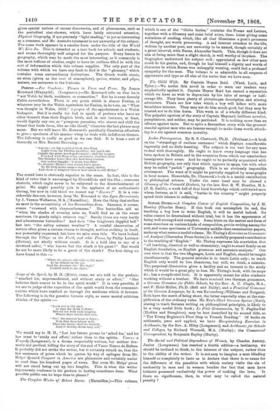Pearay. — For Cambria : Themes in Verse and Prose. By James
Kenward (Elvynydd). (Longmans.)—Mr. Kenward tells us that he is 4' not Welsh by birth, residence, or connection." But he is even fiercely Celtic nevertheless. There is one poem which is almost Fenian, or whatever may be the Welsh equivalent for Fenian, in its tone, on " What was thought in Wales, 1859," it propos of the appointment to a Welsh bishopric. But it is really too bad to speak of prelates who have no other demerit than their English birth, and in one instance, at least, would dignify any see, as "pompous parasites, who starve and chill the breast that feeds them, like an idle thrall," whatever the last phrase may mean. But we will leave Mr. Kenward's peculiarly Cambrian effusions to giro a specimen of his manner when he deals with indifferent themes. The following is really as good as wo can find. It is from a sort of threnody on Mrs. Barrett Browning :— " Aurora! on thy youthful brow was flung
Light from the Phidian marbles; thy quick ear Caught the great wood-god's music ; and thy tongue, Touched with Hym2ttian sweetness, warbled clear The thunder tones that else had been austere.
Our nobler Sappho! it alone was thine To wreathe Dione's rose round Ate's spear; To fill with holier names each empty shrine,
And show of templed Greece how much is still (Urine."
The sound here is obviously superior to the sense. In fact, this is the kind of verse that is encouraged by Eisteddfods and the like ; sonorous rhetoric, which ought never to bo subjected to the disenchantment of print. We might possibly join in the applause of an enthusiastic throng, but now in cold blood we cannot say "Encore.' It is a con- siderable descent, however, from Mr. Konward to the Lyra Devoniensis, by J. Vernon Wollaston, 3LA. (Macmillan). Here the thing that strikes us most is the eccentricity of the Devonshire flora. Summer, it seems, comes "crowned with chrysanthemums." The butterflies tell us -" when the shades of evening miss us, You'll find us on the sweet narcissus, Or gaudy tulip's crimson cup." Surely these are very hardy and adventurous butterflies ? And does "the foxglove's dappled bell" last into "the sultry autumn weather"? A careful observation of nature often gives a certain charm to thought, neither striking in itself, nor powerfully expressed, but hero wo miss oven this. We have looked through the Village on the Forth, and other Poems, by Philip Latimer (Rotten), not wholly without result. It is a bold idea to say of a drowned sailor, " who knows but the shark is his guest?" But would he not be more likely to be a guest of the shark ? Tho best thing we have found is this :- " While the plover still calls to his mate,
As he wheels in the air,
And the desolate cry' We wait!' Cometh back to me there."






































 Previous page
Previous page